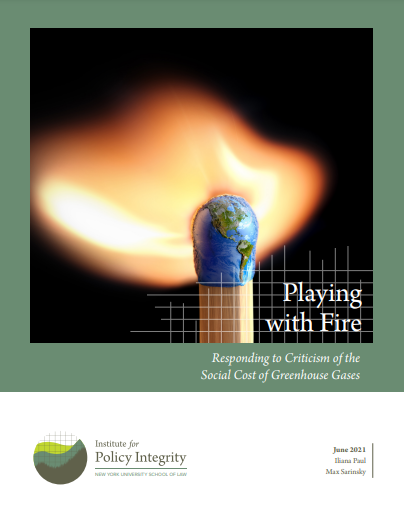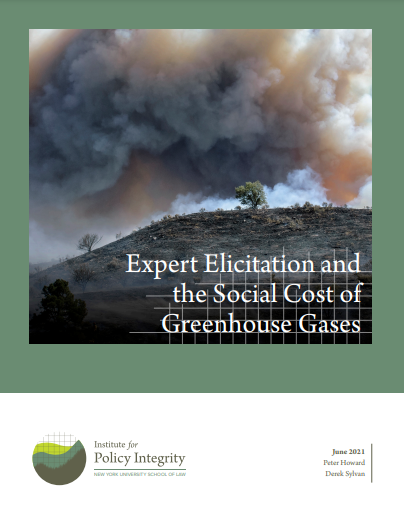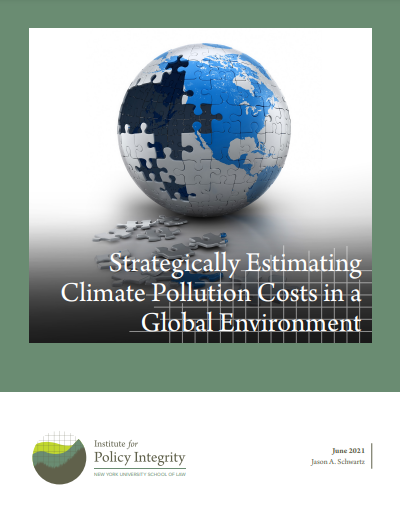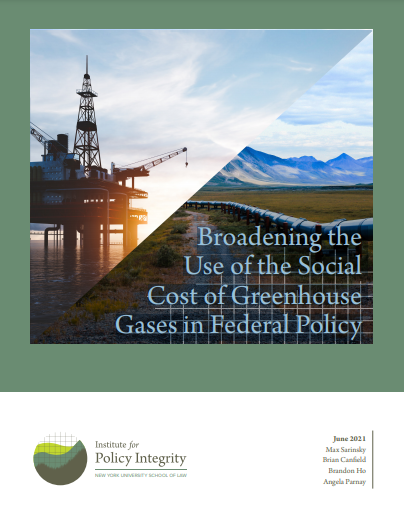-
Comments to DOE on Energy Conservation Standards for Single Package Vertical Units
The Department of Energy (DOE) asked for input on conducting its national impact analysis, including on market failures, its emissions analysis, and monetization of benefits of emissions reductions. We submitted comments suggesting that DOE continue to monetize the full climate benefits of emissions reductions using the best available estimates of the social cost of greenhouse gases.
-
Comments to the Interagency Working Group on the Social Cost of Greenhouse Gases
As part of its process for revising the social cost of greenhouse gas values, the Interagency Working Group requested public input. We published and submitted five original reports on key issues, as well as a comment letter that summarizes the reports and offers several additional points for the Working Group’s consideration.
-
Playing with Fire
Responding to Criticism of the Social Cost of Greenhouse Gases
Federal agencies will need to offer considered and detailed responses to objections raised in the notice-and-comment processes for individual regulations or administrative actions that apply the Working Group’s social cost valuations. Given its expertise, the Working Group should consider providing such responses now, so that agencies can then incorporate them into future actions. This working paper offers a blueprint for those responses.
-
Expert Elicitation and the Social Cost of Greenhouse Gases
The Interagency Working Group on the Social Cost of Greenhouse Gases can use the findings from expert elicitations to improve the U.S. federal government’s social cost of greenhouse gas estimates, which are used in regulatory cost-benefit analysis and other policy contexts. Our report highlights several component updates, incorporating data from expert elicitations, that the Working Group should consider during its current update of the social cost of greenhouse gas estimates.
-
About Time
Recalibrating the Discount Rate for the Social Cost of Greenhouse Gases (Working Paper)
In light of recent evidence, a new range of discount rates appropriate for calculating the social cost of greenhouse gases could be conservatively estimated as between 0.5%-2.5%, with a central estimate of 1.5%. Agencies should follow the Interagency Working Group’s guidance on applying new social cost of greenhouse gas estimates based on updated discount rates—and will need to justify their choices, including any departures from prior practices.
-
Strategically Estimating Climate Pollution Costs in a Global Environment
Debate has reemerged about whether federal agencies’ policy analyses should focus on those climate pollution costs that will occur only within U.S. borders, rather than on the full global valuation of climate damages. The Interagency Working Group on the Social Cost of Greenhouse Gases provides compelling justifications to focus on global estimates. Based on a wide range available evidence, the Working Group should consider recommending a domestic valuation of at least 75% or more of the global values for optional use as a lower-bound estimate in sensitivity analysis.
-
Broadening the Use of the Social Cost of Greenhouse Gases in Federal Policy
Our working paper highlights numerous areas in which the federal government should apply the social cost of greenhouse gases beyond regulatory cost-benefit analysis. It is organized under the framework of “decision-making, budgeting, and procurement” laid out in the President’s executive order, identifying a number of relevant actions—like environmental reviews conducted under NEPA and the assessment of royalty rates for federal land-management. In short, application of the social cost of greenhouse gases would be extremely beneficial for any executive branch decision with significant greenhouse gas implications.
-
Comments to New York PSC on Climate Change Vulnerability Assessments
We submitted comments to the New York Public Service Commission to voice our support for a petition concerning the impacts of climate change on utility infrastructure. Our comments emphasize that it is imperative for public utilities to identify and assess the risks that climate change poses to their assets and operations.
-
Comments to NYISO on Buyer-Side Mitigation Reforms
In a recent presentation, the New York Independent System Operator (NYISO) posed key questions related to potential buyer-side mitigation reforms. We submitted comments that provide three recommendations to NYISO.
-
Comments to SEC on Climate Change Disclosure
Climate change presents grave risk across the U.S. economy, including to corporations, their investors, the markets in which they operate, and the American public at large. The Securities and Exchange Commission (SEC) recently requested public input on climate change disclosures, posing several questions related to the development of new disclosure regulations and the enforcement of existing regulations. We worked with several partners to submit comments to the SEC, providing 15 major recommendations.











